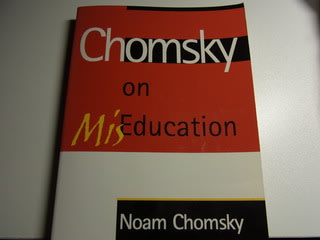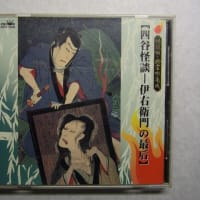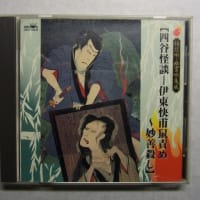“At night, in my dream, I stoutly climbed a mountain,
Going out alone with my staff of holly-wood.
A thousand crags, a hundred hundred valleys――
In my dream-journey none were unexplored.”
――‘A Dream of Mountaineering’ Bai Juyi【白居易(772-846) 】 Translated by Arthur Waley
※ 英語がいまひとつ、自由に使えない。
そこで、この本

の第2章、「Democracy and Education」を集中的に勉強してみようと思いたった。これを選んだ理由の①は、「読みたいから」であるが、②としては、講演録なので、比較的理解が容易のようであるからだ。本文を写し、翻訳したい所は翻訳し、考察したい箇所は自由に考察していく。当然時間がかかるので、この記事をそれが終わるまでトップに置いておくために、投稿日時を未来時間に設定しておいた。
なお、この本は5章あり、今回当ブログ上で勉強するのはそのうちの1章だが、著作権的に問題があれば、すぐに止めて、個人のノートで続ける事にする。ただ、ブログコメントは受け付けていない(笑)。
【2015.10.21 追記】
かなり時間がかかってしまったが、ひととおり最後まで訳し終わった。
これでようやく推敲に入れる。
【2020.1.26 追記】
小改訂。推敲はまだ始めていない(笑)。
『Democracy and Education』 Noam Chomsky
(NOTE: This article was originally delivered as a lecture at Loyola University, Chicago, 19 October 1994.)
The topic that was suggested, which I'm very happy to talk about, is “Democracy and Education”.
提案された「デモクラシーと教育」という論題についてお話しすることを、私はとても嬉しく思っています。
The phrase Democracy and Education immediately brings to mind the life and work and thought of one of the outstanding thinkers of the past century, John Dewey, who devoted the greater part of his life and his thought to this array of issues.
デモクラシーと教育ということばづかいは、前世紀の傑出した思想家のひとりであるジョン・デューイ、彼がその生涯の重要な部分とこの論点を整理する思考をささげた、彼の人生と仕事と思想を直接に想起します。
※ John Dewey(1859-1952)
I guess I should confess a special interest.
私がひとつの特別な関心の告白をせねばならぬことを、言おうと思います。
His thought was a strong influence on me in my formative years――in fact, from about age two on, for a variety of reasons that I won't go into but are real.
彼の思想は、私の人格形成期の年月に強く感化し、――それどころか、2歳からなのですが、いろいろな理由でそこへは行きませんけれど、事実なのです。
For much of his life――later he was more skeptical――Dewey seems to have felt that reforms in early education could be in themselves a major lever of social change.
彼の生涯のほとんど――後期はもっと懐疑的でしたが――デューイは初期教育の改善がそれ自体で大きな社会変革になりうると考えなければならないと思われました。
They could lead the way to a more just and free society,a society in which,in his words, “the ultimate aim of production is not production of goods, but the production of free human beings associated with one another on terms of equality.”
それがより公正で自由な社会を導くことができ、その社会とは、彼の言葉で言えば、“生産の究極的なねらいは商品の産出ではなく、ただ対等のことばで、あるもうひとりと連合した自由な人間を作ること”ということです。
This basic commitment, which runs through all of Dewey's work and thought, is profoundly at odds with the two leading currents of modern social intellectual life;one, strong in his day――he was writing in the 1920s and 1930s about these things――is associated with the command economies in Eastern Europe, the systems created by Lenin and Trotsky and turned into an even greater monstrosity by Stalin.
この基礎的言質は、全てのデューイの仕事と思想を貫き、それは現代社会知識活動の、ふたつの主な潮流と深くちぐはぐで、ひとつは彼の時代に強力だった――彼は1920年代と30年代に此れらの事について書いていました――のは、東ヨーロッパで統制経済に連合された、レーニンとトロツキーによって作られ、スターリンによってより強大な怪物へと変わった体制です。
The other, the state capitalist industrial society being constructed in the U.S. and much of the West, with the effective rule of private power.
もうひとつは、アメリカ合衆国と多くの西欧で、私権力の効果的な支配をもって構築されていった、国家資本主義的産業社会です。
Those two systems are similar in some fundamental ways, including ideologically.
これらふたつの体制は、根本的な仕方、考え方を含め、相当に似ています。
Both were, and one of them remains, deeply authoritarian in fundamental commitment, and both were very sharply and dramatically opposed to another tradition, the Left libertarian tradition, with roots in Enlightenment values, a tradition that included progressive liberals of the John Dewey variety, independent socialists like Bertrand Russell, leading elements of the Marxist mainstream, mostly anti-Bolshevik, and of course libertarian socialists and various anarchist movements, not to speak of major parts of the labor movement and other popular sectors.
共に、そして結局それらひとつひとつですが、根本的な言質において深く権威主義であり、そのどちらも非常に鋭く劇的に他の伝統と対立し、その伝統とは、左翼自由論の伝統、啓蒙思潮運動の真義に根があるもの、ジョン・デューイたちの進歩主義的自由論を含む伝統、バートランド・ラッセルのような独立した社会主義者、マルクス主義者の主流を主導するグループ、大部分の反ボルシェビキ、そしてもちろん自由論社会主義者とさまざまの無政府主義者運動、言うまでもない大部分の労働運動と他の民衆の領域です。
(第一段落、ここまで)
This independent Left, of which Dewey was a part, has strong roots in classical liberalism.
この独立的左翼は、デューイもその一部分でしたが、古典的自由主義に強くしっかりした根を持っています。
It grows right out of it, in my opinion, and it stands in sharp opposition to the absolutist currents of state capitalist and state socialist institutions and thought, including the rather extreme form of absolutism that's now called conservative in the U.S., terminology that would have amused Orwell and would have caused any genuine conservative to turn over in his grave, if you could find one.
その独立的左翼思想は、率直に古典的自由主義から育ち、私の考えでは、国家資本主義者による絶対主義者への潮流と、国家社会主義者団体と、その思想に鋭く対立して立っており、それは現在のアメリカ合衆国で保守主義と呼ばれる絶対主義からの極端な状態も含み、この用語法はオーウェルを笑わせ、どれも真の保守主義であるとの理由は、彼を墓の中でひっくり返させるであろう事を、あなたはいつでも見つけられます。
(第二段落、ここまで)
I need not stress that this picture is not the conventional one, to put it rather mildly, but I think it does have one merit, at least――namely, the merit of accuracy.
私が強調するまでもなく、むしろ控えめに言っても、この用語法の絵は慣例にのっとったものではありませんが、私が思うにそれは、ともかく、ひとつの価値を持っており、――すなわち、正確さの価値です。
I'll try to explain why.
それは何故なのかの証明をやってみましょう。
(第三段落、ここまで)
Let me return to one of Dewey's central themes, that the ultimate aim of production is not production of goods but the production of free human beings associated with one another on terms of equality.
デューイのひとつの中心主題に戻りますと、生産の究極的なねらいは商品の産出ではなく、ただ対等のことばで、あるもうひとりと連合した自由な人間を作ること、という事です。
That includes, of course, education, which was a prime concern of his.
それは勿論、彼の最重要な関心だった教育、を含みます。
The goal of education,to shift over to Bertrand Russel, is “to give a sense of the value of things other than domination, ”to help create“wise citizens of a free community,”to encourage a combination of citizenship with liberty and individual creativeness, which means that we regard“a child as a gardener regards a young tree, as something with a certain intrinsic nature, which will develop into an admirable form, given proper soil and air and light.”
教育の目標とは、バートランド・ラッセルに転じますと、「支配の他に価値の意義を授けること」、「自由な共同体の思慮ある市民」の創造を助けること、自由で創造的な各個の一員として、市民の団結を励ますこと、そしてその意味は、我々が「子供を、園丁が若い木を見るように、本来備わっている本質を確信している何かのように、固有の土と空気と光から贈られた、みごとな形を発達させていく」ようにみなす、ということです。
In fact, much as they disagreed on many other things, as they did, Dewey and Russell did agree on what Russell called this “humanistic conception,”with its roots in the Enlightenment, the idea that education is not to be viewed as something like filling a vessel with water but, rather, assisting a flower to grow in its own way―an eighteenth-century view that they revived.
実際に、彼らは他の多くの事柄で意見が異ったのですけれども、彼ら、デューイとラッセルは、ラッセルが「人本主義的構想」と呼んだ、啓蒙思潮運動にその根を持つ、教育は容器を水で満たすようなものとしてみなすべきではなく、それよりは、花が自分自身の方法で育つという考えに同意しました。――彼らが復活させた18世紀の光景です。
In other words, providing the circumstances in which the normal creative patterns will flourish.
他の言葉では、正常で創造的な行動様式が花開くように、周囲の環境を準備する、ということです。
(第四段落、ここまで)
Dewey and Russell also shared the understanding that these leading ideas of the Enlightenment and classical liberalism had a revolutionary character, and retained it right at the time they were writing, in the early half of this century.
デューイとラッセルもまた、これら啓蒙思潮運動と古典的,正統的自由主義が持つ革命的な特質を導く思想の理解を共有し、彼らが今世紀前半の時に書いていたものを、正(ただ)しく、ずっと持ちつづけました。
If implemented, these ideas could produce free human beings whose values were not accumulation and domination but, rather,free association on terms of equality and sharing and cooperation, participating on equal terms to achieve common goals that were democratically conceived.
もし実行されたなら、これらの思想は、利殖と支配の価値ではなく、それより、平等と共同と参加の対等で自由な連合を価値あるものと考え尊重する、民主政体を想像した、あたりまえの目的地に達する、自由な人間を作り出すことができます。
There was only contempt for what Adam Smith called the “vile maxim of the masters of mankind, all for ourselves, and nothing for other people,” the guiding principle that nowadays we're taught to admire and revere, as traditional values have eroded under unremitting attack, the so-called conservatives leading the onslaught in recent decades.
アダム・スミスが「人類支配者の、全てを私自身のために、他の者らには無を、という、うす汚い格言」と呼んだ指導原理は、今日では、賞賛し、あがめるよう我々に教えられ、伝統的価値は絶え間のない攻撃にむしばまれ、ここ数十年、保守主義とそう呼ばれたものが指導する猛攻撃には、軽蔑があるだけでした。
(第五段落、ここまで)
It's worth taking time to notice how sharp and dramatic is the clash of values between, on the one hand, the humanistic conception that runs from the Enlightenment up to leading twentieth-century figures like Russell and Dewey and, on the other hand, the prevailing doctrines of today, the doctrines that were denounced by Adam Smith as the “vile maxim”and also denounced by the lively and vibrant working-class press of over century ago,which condemned what it called the “new spirit of the age,gain wealth, forgetting all but self”――Smith's vile maxim.
それがどれほど鋭く劇的に他の一方の価値との間で衝突したかについて注目する事は、時間を取るに値しますし、一方は、ラッセルとデューイのような人物が20世紀に主導し広めた啓蒙主義から来る人本主義的概念であり、もう一方は、今日、広く流布している、アダム・スミスによって「うす汚い格言」と糾弾された教義、同じく、一世紀を超えた昔、生きいきと鋭く感応した労働者階級の新聞によって糾弾された、「自分以外を全て忘れて、富を獲得せよ、という新しい時代精神」――スミスのうす汚い格言です。
It's quite remarkable to trace the evolution of values from a precapitalist thinker like Adam Smith, with his stress on sympathy and the goal of perfect equality and the basic human right to creative work, and contrast that and move on to the present to those who laud the “new spirit of the age,” sometimes rather shamelessly invoking Adam Smith's name.
これは実に驚くべきことで、アダム・スミスのような前資本主義的思想家からの価値の展開の跡は、彼が力説した、共感と完全な平等の目的と創造的仕事のための基本的人権から、時に、逆に、恥知らずにもアダム・スミスの名前を引き合いに出し、現在彼らが賛美する「新しい時代精神」に動いています。
For example, Nobel Prize-winning economist James Buchanan, who writes that what each person seeks in an “ideal situation”is “mastery over a world of slaves.”
例えば、ノーベル賞受賞の経済学者、ジェームス・ブキャナン、彼は、おのおのの人間が得ようとする「理想の状態」は「奴隷の世界を支配しつくす事だ」と書いています。
That's what you seek, in case you hadn't noticed, something that Adam Smith would have regarded as simply pathological.
それがあなたの探し求めるものであり、あなたが認知していない真相だという、何かそれは、アダム・スミスなら、単なる病気のようだとみなすでしょう。
(第六段落、ここまで)
The best book I know of on Adam Smith's actual thought(Adam Smith and His Legacy for Modern Capitalism)is written by a professor here at Loyola, Patricia Werhane.
アダム・スミスの真の思想だと、私が知る最良の書物は(『アダム・スミスと現代資本主義への彼の遺産』)、ここロヨラ大学の、パトリシア・ウェアヘーン教授によって書かれました。
Of course, it's always best to read the original.
勿論、いつでも最も良いのは、原書を読むことです。
(第七段落、ここまで)
One of the most dramatic illustrations of the “new spirit of the age” and its values is the commentary that's now in the press on the difficulties we face in uplifting the people of Eastern Europe.
「新しい時代精神」のもっとも劇的な実例と、その価値は、今新聞に載っている、私たちが直面する、東ヨーロッパの人々の精神を高揚させている困難についての論評です。
As you know,we're now extending to them,our new beneficiaries, the loving care that we've lavished on our wards elsewhere in Latin America and the Philippines and so on,with consequences that are dramatically clear and consistent in these horror chambers but also are miraculously free of any lessons about who we are and what we do.
知ってのとおり、私たちは、今それらを、私たちの地区外であるラテンアメリカとフィリピンとその先も同様に、愛情に満ちた心づかいを惜しみなく与え、私たちの新しい受益者たちを広げていて、結果は劇的にはっきりしており、それに伴うこれらの首尾一貫した、部屋に閉じ込める恐怖は、けれどもまた、我々が何者であり、何をするかについて、どんな叱責も奇跡的に罪に問われていないのです。
One might ask why.
ある疑問も、無理はありません。
In any event, we are now proceeding to uplift the people liberated from communism as we've in the past liberated Haitians and Brazilians and Guatemalans and Filipinos and Native Americans and African slaves and so on.
少なくとも、私たちは今、共産主義から解放された人々を、私たちが過去に解放したハイチ人,ブラジル人,グアテマラ人,フィリピン人,原住アメリカ人,アフリカの奴隷たち,そしてその先も同様に、向上させることを続行しています。
The New York Times is currently running an interesting series of articles on these different problems.
ニューヨーク・タイムズは目下、これらのいろいろな問題に関する記事の、興味深い連載を載せています。
They give some interesting insight into the prevailing values.
それは、支配的な価値の調査の方に、いくらかの興味深い洞察を与えています。
There was an article on East Germany, for example,written by Steven Kinzer.
たとえば、スティーブン・キンザーによって書かれた、東ドイツに関する一本の記事がありました。
It opens by quoting a priest who was one of the leaders of the popular protests against the communist regime in East Germany.
それは、東ドイツの、共産主義の支配体制に対抗した、民衆の異議申し立ての指導者のひとりである聖職者の引用から始まります。
He describes the growing concerns there about what's happening to the society.
彼は、社会に何が起こっているかについて、その場所に増大する懸念を、言葉で述べています。
He says, “Brutal competition and the lust for money are destroying our sense of community, and almost everyone feels level of fear or depression or insecurity ”as they master the new spirit of the age in which we instruct the backward peoples of the world.
彼は、「残忍な競争と金銭への熱望は共同体の感覚を破壊しており、ほとんどのあらゆる人が、恐れ,憂鬱,不安の水準を感じている」と述べていて、彼ら新時代精神の支配者は、私たち憶えの悪い人々に教え込むようなのです。
(第八段落、ここまで)
The next article turned to what we regard as the showplace, the real success story, Poland, written by Jane Perlez.
次の記事は、変わって私たちが名所のようにみなしている、ジェーン・パールツによって書かれた、実際の成功物語です。
The headline reads, “Fast and Slow Lanes on the Capitalist Road.”
見出しは、「資本主義的道路の高速車線と低速車線」です。
The structure of the story is that some are getting the point but there are also some who are still backwards.
その物語の構造は、いくらかの人々は要点を得ているが、しかし同じくいくらかに人々はまだ憶えが悪いというものです。
She gives one example of a good student and one example of a “thriving example”of the best in modern capitalist Poland.
彼女は、良い学生の手本と、ひとつの例、最も良い現代資本主義的ポーランドの「繁栄する例」を伝えています。
It produces intricately designed wedding gowns sold mostly to rich Germans and to that tiny sector of superrich Poles.
それは、複雑にデザインされたウェディングドレスを、主として豊かなドイツ人と、ごくわずかな領域のすごく富んだポーランド人に作り、売ることです。
This is in a country where poverty has more than doubled since the reforms were instituted, according to a World Bank study last July, and incomes have dropped about 30 percent.
これが、改革が制定されてから、倍増以上が貧困になった国で、世界銀行の昨7月の一致した研究は、所得が約30パーセント落ちています。
However, the people who are hungry and jobless can look at the intricately designed wedding gowns in the store windows, appreciating the new spirit of the age, so it's understandable that Poland is hailed as the great success story for our achievements.
いかに民衆が腹を減らし失業しても、複雑にデザインされたウェディングドレスを、デパートの陳列窓で見ることができ、新しい時代精神をありがたく思う、そうです、これがポーランドで歓呼されて迎えられた、わかりやすい、私たちの功績の成功物語なのです。
(第九段落、ここまで)
A good student explains that “People have to be taught to understand they must fight for themselves and can't rely on others.”
良い学生は、「民衆は彼ら自身のために戦わなければならず、他人は頼みにできないと、民衆に理解することを悟らせなければならない」と説明します。
She is describing a training course she's running that's trying to instill American values among people who are still brainwashed with slogans like “I'm a miner.Who else better?”
彼女は、「私は坑夫だ、他に上等なのは誰だ?」というようなスローガンに、まだ洗脳されている民衆の中へ、アメリカ的価値を除々に染み込ませることの試みを、記述しています。
They have got to get that out of their heads.
彼らはそのスローガンの洗脳を、頭から追い出させなければならないのです。
A lot of people are better, including people who can design wedding gowns for rich Germans.
多くの人々はより上等の、豊かなドイツ人たちのために、ウェディングドレスをデザインすることができる人々に算入しています。
That's the chosen illustration of the success story of American values.
それは、アメリカ的価値の成功物語の、神に選ばれた例証です。
Then there are the failures, still on the slow lane on the capitalist road.
次には、まだ、資本主義的道路の低速車線にいる失敗者です。
Here she picks one as her example, a forty-year-old coal miner who “sits in his wood-paneled living room admiring the fruits of his labor under communism――a television set, comfortable furniture, a shiny, modern kitchen, ”and he wonders “why he's at home,jobless and dependent on welfare payments, ” having not yet absorbed the new spirit of the age, gain wealth, forgetting all but self,and not “I'm a miner.Who else is better?”
ここに彼女がとりあげるひとつの例があり、40歳の坑夫、彼は「木の壁板をはめられたリビングルームに座り、――テレビセット,快適な家具,ピカピカの,モダンなキッチン,と、共産主義の下での彼の労働の成果を賞賛しており」、また彼は「なぜ彼自身は家にいて、失業し、生活保護費をうけて依存するのか」と不思議に思い、「私は坑夫だ、他に上等なのは誰だ?」ではなく、自己以外はすべてを忘れ、富を獲得する、新しい時代精神を、まだ、身につけていないのです。
The series goes on like that.
連載はこのように続いていきます。
It's interesting to read and to see what's taken for granted.
これは、何を軽く見ているのかを、興味深く読み、見ることです。
(第十段落、ここまで)
What's happening in Eastern Europe recapitulates what's gone on in our Third World domains for a long time and falls into place in a much longer story.
東ヨーロッパで何が起こっているのかは、我々が第三世界の勢力範囲で長い間、何を続けて来たかの、長い長い物語の場所になる、要点の繰り返しです。
It's very familiar from our own history and the history of England before us.
これは我々自身の歴史からとてもよく知られており、英国は以前の我々です。
There's a recent book, by a distinguished Yale University labor historian,David Montgomery, in which he points out that modern America was created over the protests of its working people.
ここにイェール大学の注目された労働史家、デビット・モンゴメリーの最近の著作があり、そのなかで彼は、現代のアメリカは、労働する人々の異議申し立てを越えて作られたと、指し示します。
He's quite right.
彼はまったく正しいのです。
Those protests were vigorous and outspoken, particularly in the working-class and community press that flourished in the U.S. from the early nineteenth century up until the 1950s,when it was finally destroyed by private power, as its counterpart in England was about ten years later.
これらの異議申し立ては、特に労働階級の中において活発で、率直で、そして19世紀初期から1950年代までの合衆国で花開いた共同体新聞、それは最終的に私権力によって破壊され、同様によく似た英国での破壊は、約10年後でした。
The first major study of this topic was in 1924 by Norman Ware.
この論題の最初の主要な研究は、1924年のノーマン・ウェアでした。

It still makes very illuminating reading.
これは今でもきわめて、その学問研究を照らしています。
It was published here in Chicago and reprinted very recently by Ivan Dee,a local publisher.
これは、ここシカゴで出版され、ごく最近、地方出版社のアイヴァン・ディーによって再版されました。
It's very much worth reading.
これはまさに読むに値します。
It's a work that set off very substantial study in social history.
これは社会史を出発させる、非常に価値ある研究の労作です。
※ 『THE INDUSTRIAL WORKER 1840-1860』 NORMAN WARE
Chapter 1. The State of the Nation
Chapter 2. The Immigrant and the Homes of the Poor
Chapter 3. “The Spirit of the Age”
Chapter 4. The Degredation of the Worker
Chapter 5. The New Power:The Factory Controversy
Chapter 6. The New Power:The Dangers of Paternalism
Chapter 7. The Degradation of the Operative
Chapter 8. The Ten-Hour Movement:Industrial,1840-50
Chapter 9. The Change of Personnel
Chapter 10. The Ten-Hour Movement:Political,1850-60
Chapter 11. The Reformers:Associationists
Chapter 12. Land Reform
Chapter 13. Coöperation
Chapter 14. The Labor Movement:Defensive,1840-50
Chapter 15. The Labor Movement:Aggressive,1850-60
(第十一段落、ここまで) (写真と下線は、Sirota 81)
What Ware describes, looking mostly at the labor press, is how the value system that was advocated by private power had to be beaten into the heads of ordinary people, who had to be taught to abandon normal human sentiments and to replace them with the new spirit of the age,as they called it.
何をウェアは記述しているかというと、主として労働新聞で調べてみていますが、どのようにして価値の体系は、私権力によって、普通の人々の頭の中を打ちのめされなければならなかったのか、彼らは正常な人間の感情を置き去りにして、私権力側が新しい時代精神と彼らがそれを呼んだものを、教えられねばならなかったのか、ということです。
He reviews the mainly mid-nineteenth century working-class press, often, incidentally, run by working-class women.
彼は主として19世紀中頃の労働新聞を精密に調べていますが、多くの場合、偶然に、労働階級の女性たちによって運営されていました。
The themes that run through it are constant for a long period.
主題は長い期間の間、不変なものを貫きます。
They are concerned with what they call“degradation” and loss of dignity and independence, loss of self-respect, the decline of the worker as a person, the sharp decline in cultural level and cultural attainments as workers were subjected to what they called “wage slavery, ” which they regarded as not very different from the chattel slavery they had fought to uproot during the Civil War.
彼らは、「退廃」と彼らが呼ぶ、尊厳と独立の喪失、自尊心の喪失、ひとりの人間としての労働者の凋落、文化水準と文化的技能の激しい低下、同様に、労働者が「賃金奴隷制」と彼らが呼んだものに服従させられ、それは彼らが内戦の間中ずっと根絶することを闘った奴隷制度そのものと、あまり異なっていないと、みなしました。
※ Civil War = American Civil War, War between the States = 南北戦争
Particularly dramatic and quite relevant to today's problems was the sharp decline in what we call “high culture, ” reading of classics and contemporary literature by the people who were called the factory girls in Lowell and by craftsmen and other workers.
格別に劇的で、現代の問題と実に直接的に関連するのは、私たちが「高級文化」と呼ぶものの激しい低下で、ローウェルで女工と呼ばれた人々によって、そして熟練工と他の労働者たちによって、古典と現代文学を読んでいたことです。
Craftsmen would hire somebody to read to them while they were working because they were interested and had libraries.
熟練工は仕事をしている間に、だれかそれを読む人を雇うことができ、なぜなら彼らはそれに関心があり、図書館を持っていました。
All that had to go.
すべては消え失せねばなりませんでした。
(第十二段落、ここまで)
What they described, paraphrasing the labor press, is that when you sell your product, you retain your person.
彼らは何を記述していたのか、労働新聞を言い換えると、あなたがあなたの生産品を売る時、あなたはあなたの人格を保持する、ということです。
But when you sell your labor, you sell yourself, losing the rights of free men and becoming vassals of mammoth establishments of a “moneyed aristocracy” that “threatens annihilation to every man who dares to question their right to enslave and oppress.”
しかし、あなたがあなたの労働を売る時、あなたはあなた自身を売ることになり、自由な人間の権利をなくし、巨大な既成の権力組織、「金銭の貴族的政治」の配下になり、それは「あえて彼らの権利に疑問を呈するすべての人間を全滅すると威嚇し、奴隷にし、圧迫」するのです。
“Those who work in the mills ought to own them, ” not have the status of machines ruled by private “despots” who are entrenching “monarchic principles on democratic soil” as they drive downward freedom and rights, civilization, health, morals, and intellectuality in the new commercial feudalism.
「製粉所で働く人々は彼ら自分自身であるべきで」、「民主的土壌の上の君主制の原理」を固定化している、自由,権利,文明,健康,道徳,それを知的に新しい商業封建制度のなかの堕落へ追い立てる、私的「専制君主」による機械に支配される身分であるべきではない。
(第十三段落、ここまで)
Just in case you are confused,this is long before any influence of Marxism.
ちょっと、みなさんを困惑させたらいけませんので、これはマルクス主義のどんな影響からも、遠い以前です。
This is American workers talking about their experiences in the 1840s.
これは、アメリカの労働者たちが、彼らの1840年代についての経験を語っていることなのです。
The labor press also condemned what they called the “bought priesthood,” referring to the media and the universities and the intellectual class, that is,the apologists who sought to justify the absolute despotism that was the new spirit of the age and to instill its sordid and demeaning values.
労働新聞はまた、彼らが「買収され抱き込まれた聖職者」と呼んだ、メディア関係者,大学関係者,知識階級,それを糾弾しており、彼ら絶対的な専制を正当化することを求める擁護者は、新しい時代精神と、そのあさましい屈辱的な価値を、除々に染み込ませました。
One of the early leaders of the AFL, Henry Demarest Lloyd, about a century ago, late nineteenth century, expressed the standard view when he described the misson of the labor movement as to overcome “the sins and superstitions of the market” and to defend democracy by extending it to control over industry by working people.
AFLの初期の指導者のひとり、ヘンリー・D・ロイドは、およそ1世紀前の、19世紀のおわりに、標準見解を表明し、彼が記述した労働運動の使命は、「罪と市場の迷信」に打ち勝つことで、労働者として、産業を支配する管理の拡張からデモクラシーを守ることです。
(第十四段落、ここまで)
Going out alone with my staff of holly-wood.
A thousand crags, a hundred hundred valleys――
In my dream-journey none were unexplored.”
――‘A Dream of Mountaineering’ Bai Juyi【白居易(772-846) 】 Translated by Arthur Waley
※ 英語がいまひとつ、自由に使えない。
そこで、この本

の第2章、「Democracy and Education」を集中的に勉強してみようと思いたった。これを選んだ理由の①は、「読みたいから」であるが、②としては、講演録なので、比較的理解が容易のようであるからだ。本文を写し、翻訳したい所は翻訳し、考察したい箇所は自由に考察していく。当然時間がかかるので、この記事をそれが終わるまでトップに置いておくために、投稿日時を未来時間に設定しておいた。
なお、この本は5章あり、今回当ブログ上で勉強するのはそのうちの1章だが、著作権的に問題があれば、すぐに止めて、個人のノートで続ける事にする。ただ、ブログコメントは受け付けていない(笑)。
【2015.10.21 追記】
かなり時間がかかってしまったが、ひととおり最後まで訳し終わった。
これでようやく推敲に入れる。
【2020.1.26 追記】
小改訂。推敲はまだ始めていない(笑)。
『Democracy and Education』 Noam Chomsky
(NOTE: This article was originally delivered as a lecture at Loyola University, Chicago, 19 October 1994.)
The topic that was suggested, which I'm very happy to talk about, is “Democracy and Education”.
提案された「デモクラシーと教育」という論題についてお話しすることを、私はとても嬉しく思っています。
The phrase Democracy and Education immediately brings to mind the life and work and thought of one of the outstanding thinkers of the past century, John Dewey, who devoted the greater part of his life and his thought to this array of issues.
デモクラシーと教育ということばづかいは、前世紀の傑出した思想家のひとりであるジョン・デューイ、彼がその生涯の重要な部分とこの論点を整理する思考をささげた、彼の人生と仕事と思想を直接に想起します。
※ John Dewey(1859-1952)
I guess I should confess a special interest.
私がひとつの特別な関心の告白をせねばならぬことを、言おうと思います。
His thought was a strong influence on me in my formative years――in fact, from about age two on, for a variety of reasons that I won't go into but are real.
彼の思想は、私の人格形成期の年月に強く感化し、――それどころか、2歳からなのですが、いろいろな理由でそこへは行きませんけれど、事実なのです。
For much of his life――later he was more skeptical――Dewey seems to have felt that reforms in early education could be in themselves a major lever of social change.
彼の生涯のほとんど――後期はもっと懐疑的でしたが――デューイは初期教育の改善がそれ自体で大きな社会変革になりうると考えなければならないと思われました。
They could lead the way to a more just and free society,a society in which,in his words, “the ultimate aim of production is not production of goods, but the production of free human beings associated with one another on terms of equality.”
それがより公正で自由な社会を導くことができ、その社会とは、彼の言葉で言えば、“生産の究極的なねらいは商品の産出ではなく、ただ対等のことばで、あるもうひとりと連合した自由な人間を作ること”ということです。
This basic commitment, which runs through all of Dewey's work and thought, is profoundly at odds with the two leading currents of modern social intellectual life;one, strong in his day――he was writing in the 1920s and 1930s about these things――is associated with the command economies in Eastern Europe, the systems created by Lenin and Trotsky and turned into an even greater monstrosity by Stalin.
この基礎的言質は、全てのデューイの仕事と思想を貫き、それは現代社会知識活動の、ふたつの主な潮流と深くちぐはぐで、ひとつは彼の時代に強力だった――彼は1920年代と30年代に此れらの事について書いていました――のは、東ヨーロッパで統制経済に連合された、レーニンとトロツキーによって作られ、スターリンによってより強大な怪物へと変わった体制です。
The other, the state capitalist industrial society being constructed in the U.S. and much of the West, with the effective rule of private power.
もうひとつは、アメリカ合衆国と多くの西欧で、私権力の効果的な支配をもって構築されていった、国家資本主義的産業社会です。
Those two systems are similar in some fundamental ways, including ideologically.
これらふたつの体制は、根本的な仕方、考え方を含め、相当に似ています。
Both were, and one of them remains, deeply authoritarian in fundamental commitment, and both were very sharply and dramatically opposed to another tradition, the Left libertarian tradition, with roots in Enlightenment values, a tradition that included progressive liberals of the John Dewey variety, independent socialists like Bertrand Russell, leading elements of the Marxist mainstream, mostly anti-Bolshevik, and of course libertarian socialists and various anarchist movements, not to speak of major parts of the labor movement and other popular sectors.
共に、そして結局それらひとつひとつですが、根本的な言質において深く権威主義であり、そのどちらも非常に鋭く劇的に他の伝統と対立し、その伝統とは、左翼自由論の伝統、啓蒙思潮運動の真義に根があるもの、ジョン・デューイたちの進歩主義的自由論を含む伝統、バートランド・ラッセルのような独立した社会主義者、マルクス主義者の主流を主導するグループ、大部分の反ボルシェビキ、そしてもちろん自由論社会主義者とさまざまの無政府主義者運動、言うまでもない大部分の労働運動と他の民衆の領域です。
(第一段落、ここまで)
This independent Left, of which Dewey was a part, has strong roots in classical liberalism.
この独立的左翼は、デューイもその一部分でしたが、古典的自由主義に強くしっかりした根を持っています。
It grows right out of it, in my opinion, and it stands in sharp opposition to the absolutist currents of state capitalist and state socialist institutions and thought, including the rather extreme form of absolutism that's now called conservative in the U.S., terminology that would have amused Orwell and would have caused any genuine conservative to turn over in his grave, if you could find one.
その独立的左翼思想は、率直に古典的自由主義から育ち、私の考えでは、国家資本主義者による絶対主義者への潮流と、国家社会主義者団体と、その思想に鋭く対立して立っており、それは現在のアメリカ合衆国で保守主義と呼ばれる絶対主義からの極端な状態も含み、この用語法はオーウェルを笑わせ、どれも真の保守主義であるとの理由は、彼を墓の中でひっくり返させるであろう事を、あなたはいつでも見つけられます。
(第二段落、ここまで)
I need not stress that this picture is not the conventional one, to put it rather mildly, but I think it does have one merit, at least――namely, the merit of accuracy.
私が強調するまでもなく、むしろ控えめに言っても、この用語法の絵は慣例にのっとったものではありませんが、私が思うにそれは、ともかく、ひとつの価値を持っており、――すなわち、正確さの価値です。
I'll try to explain why.
それは何故なのかの証明をやってみましょう。
(第三段落、ここまで)
Let me return to one of Dewey's central themes, that the ultimate aim of production is not production of goods but the production of free human beings associated with one another on terms of equality.
デューイのひとつの中心主題に戻りますと、生産の究極的なねらいは商品の産出ではなく、ただ対等のことばで、あるもうひとりと連合した自由な人間を作ること、という事です。
That includes, of course, education, which was a prime concern of his.
それは勿論、彼の最重要な関心だった教育、を含みます。
The goal of education,to shift over to Bertrand Russel, is “to give a sense of the value of things other than domination, ”to help create“wise citizens of a free community,”to encourage a combination of citizenship with liberty and individual creativeness, which means that we regard“a child as a gardener regards a young tree, as something with a certain intrinsic nature, which will develop into an admirable form, given proper soil and air and light.”
教育の目標とは、バートランド・ラッセルに転じますと、「支配の他に価値の意義を授けること」、「自由な共同体の思慮ある市民」の創造を助けること、自由で創造的な各個の一員として、市民の団結を励ますこと、そしてその意味は、我々が「子供を、園丁が若い木を見るように、本来備わっている本質を確信している何かのように、固有の土と空気と光から贈られた、みごとな形を発達させていく」ようにみなす、ということです。
In fact, much as they disagreed on many other things, as they did, Dewey and Russell did agree on what Russell called this “humanistic conception,”with its roots in the Enlightenment, the idea that education is not to be viewed as something like filling a vessel with water but, rather, assisting a flower to grow in its own way―an eighteenth-century view that they revived.
実際に、彼らは他の多くの事柄で意見が異ったのですけれども、彼ら、デューイとラッセルは、ラッセルが「人本主義的構想」と呼んだ、啓蒙思潮運動にその根を持つ、教育は容器を水で満たすようなものとしてみなすべきではなく、それよりは、花が自分自身の方法で育つという考えに同意しました。――彼らが復活させた18世紀の光景です。
In other words, providing the circumstances in which the normal creative patterns will flourish.
他の言葉では、正常で創造的な行動様式が花開くように、周囲の環境を準備する、ということです。
(第四段落、ここまで)
Dewey and Russell also shared the understanding that these leading ideas of the Enlightenment and classical liberalism had a revolutionary character, and retained it right at the time they were writing, in the early half of this century.
デューイとラッセルもまた、これら啓蒙思潮運動と古典的,正統的自由主義が持つ革命的な特質を導く思想の理解を共有し、彼らが今世紀前半の時に書いていたものを、正(ただ)しく、ずっと持ちつづけました。
If implemented, these ideas could produce free human beings whose values were not accumulation and domination but, rather,free association on terms of equality and sharing and cooperation, participating on equal terms to achieve common goals that were democratically conceived.
もし実行されたなら、これらの思想は、利殖と支配の価値ではなく、それより、平等と共同と参加の対等で自由な連合を価値あるものと考え尊重する、民主政体を想像した、あたりまえの目的地に達する、自由な人間を作り出すことができます。
There was only contempt for what Adam Smith called the “vile maxim of the masters of mankind, all for ourselves, and nothing for other people,” the guiding principle that nowadays we're taught to admire and revere, as traditional values have eroded under unremitting attack, the so-called conservatives leading the onslaught in recent decades.
アダム・スミスが「人類支配者の、全てを私自身のために、他の者らには無を、という、うす汚い格言」と呼んだ指導原理は、今日では、賞賛し、あがめるよう我々に教えられ、伝統的価値は絶え間のない攻撃にむしばまれ、ここ数十年、保守主義とそう呼ばれたものが指導する猛攻撃には、軽蔑があるだけでした。
(第五段落、ここまで)
It's worth taking time to notice how sharp and dramatic is the clash of values between, on the one hand, the humanistic conception that runs from the Enlightenment up to leading twentieth-century figures like Russell and Dewey and, on the other hand, the prevailing doctrines of today, the doctrines that were denounced by Adam Smith as the “vile maxim”and also denounced by the lively and vibrant working-class press of over century ago,which condemned what it called the “new spirit of the age,gain wealth, forgetting all but self”――Smith's vile maxim.
それがどれほど鋭く劇的に他の一方の価値との間で衝突したかについて注目する事は、時間を取るに値しますし、一方は、ラッセルとデューイのような人物が20世紀に主導し広めた啓蒙主義から来る人本主義的概念であり、もう一方は、今日、広く流布している、アダム・スミスによって「うす汚い格言」と糾弾された教義、同じく、一世紀を超えた昔、生きいきと鋭く感応した労働者階級の新聞によって糾弾された、「自分以外を全て忘れて、富を獲得せよ、という新しい時代精神」――スミスのうす汚い格言です。
It's quite remarkable to trace the evolution of values from a precapitalist thinker like Adam Smith, with his stress on sympathy and the goal of perfect equality and the basic human right to creative work, and contrast that and move on to the present to those who laud the “new spirit of the age,” sometimes rather shamelessly invoking Adam Smith's name.
これは実に驚くべきことで、アダム・スミスのような前資本主義的思想家からの価値の展開の跡は、彼が力説した、共感と完全な平等の目的と創造的仕事のための基本的人権から、時に、逆に、恥知らずにもアダム・スミスの名前を引き合いに出し、現在彼らが賛美する「新しい時代精神」に動いています。
For example, Nobel Prize-winning economist James Buchanan, who writes that what each person seeks in an “ideal situation”is “mastery over a world of slaves.”
例えば、ノーベル賞受賞の経済学者、ジェームス・ブキャナン、彼は、おのおのの人間が得ようとする「理想の状態」は「奴隷の世界を支配しつくす事だ」と書いています。
That's what you seek, in case you hadn't noticed, something that Adam Smith would have regarded as simply pathological.
それがあなたの探し求めるものであり、あなたが認知していない真相だという、何かそれは、アダム・スミスなら、単なる病気のようだとみなすでしょう。
(第六段落、ここまで)
The best book I know of on Adam Smith's actual thought(Adam Smith and His Legacy for Modern Capitalism)is written by a professor here at Loyola, Patricia Werhane.
アダム・スミスの真の思想だと、私が知る最良の書物は(『アダム・スミスと現代資本主義への彼の遺産』)、ここロヨラ大学の、パトリシア・ウェアヘーン教授によって書かれました。
Of course, it's always best to read the original.
勿論、いつでも最も良いのは、原書を読むことです。
(第七段落、ここまで)
One of the most dramatic illustrations of the “new spirit of the age” and its values is the commentary that's now in the press on the difficulties we face in uplifting the people of Eastern Europe.
「新しい時代精神」のもっとも劇的な実例と、その価値は、今新聞に載っている、私たちが直面する、東ヨーロッパの人々の精神を高揚させている困難についての論評です。
As you know,we're now extending to them,our new beneficiaries, the loving care that we've lavished on our wards elsewhere in Latin America and the Philippines and so on,with consequences that are dramatically clear and consistent in these horror chambers but also are miraculously free of any lessons about who we are and what we do.
知ってのとおり、私たちは、今それらを、私たちの地区外であるラテンアメリカとフィリピンとその先も同様に、愛情に満ちた心づかいを惜しみなく与え、私たちの新しい受益者たちを広げていて、結果は劇的にはっきりしており、それに伴うこれらの首尾一貫した、部屋に閉じ込める恐怖は、けれどもまた、我々が何者であり、何をするかについて、どんな叱責も奇跡的に罪に問われていないのです。
One might ask why.
ある疑問も、無理はありません。
In any event, we are now proceeding to uplift the people liberated from communism as we've in the past liberated Haitians and Brazilians and Guatemalans and Filipinos and Native Americans and African slaves and so on.
少なくとも、私たちは今、共産主義から解放された人々を、私たちが過去に解放したハイチ人,ブラジル人,グアテマラ人,フィリピン人,原住アメリカ人,アフリカの奴隷たち,そしてその先も同様に、向上させることを続行しています。
The New York Times is currently running an interesting series of articles on these different problems.
ニューヨーク・タイムズは目下、これらのいろいろな問題に関する記事の、興味深い連載を載せています。
They give some interesting insight into the prevailing values.
それは、支配的な価値の調査の方に、いくらかの興味深い洞察を与えています。
There was an article on East Germany, for example,written by Steven Kinzer.
たとえば、スティーブン・キンザーによって書かれた、東ドイツに関する一本の記事がありました。
It opens by quoting a priest who was one of the leaders of the popular protests against the communist regime in East Germany.
それは、東ドイツの、共産主義の支配体制に対抗した、民衆の異議申し立ての指導者のひとりである聖職者の引用から始まります。
He describes the growing concerns there about what's happening to the society.
彼は、社会に何が起こっているかについて、その場所に増大する懸念を、言葉で述べています。
He says, “Brutal competition and the lust for money are destroying our sense of community, and almost everyone feels level of fear or depression or insecurity ”as they master the new spirit of the age in which we instruct the backward peoples of the world.
彼は、「残忍な競争と金銭への熱望は共同体の感覚を破壊しており、ほとんどのあらゆる人が、恐れ,憂鬱,不安の水準を感じている」と述べていて、彼ら新時代精神の支配者は、私たち憶えの悪い人々に教え込むようなのです。
(第八段落、ここまで)
The next article turned to what we regard as the showplace, the real success story, Poland, written by Jane Perlez.
次の記事は、変わって私たちが名所のようにみなしている、ジェーン・パールツによって書かれた、実際の成功物語です。
The headline reads, “Fast and Slow Lanes on the Capitalist Road.”
見出しは、「資本主義的道路の高速車線と低速車線」です。
The structure of the story is that some are getting the point but there are also some who are still backwards.
その物語の構造は、いくらかの人々は要点を得ているが、しかし同じくいくらかに人々はまだ憶えが悪いというものです。
She gives one example of a good student and one example of a “thriving example”of the best in modern capitalist Poland.
彼女は、良い学生の手本と、ひとつの例、最も良い現代資本主義的ポーランドの「繁栄する例」を伝えています。
It produces intricately designed wedding gowns sold mostly to rich Germans and to that tiny sector of superrich Poles.
それは、複雑にデザインされたウェディングドレスを、主として豊かなドイツ人と、ごくわずかな領域のすごく富んだポーランド人に作り、売ることです。
This is in a country where poverty has more than doubled since the reforms were instituted, according to a World Bank study last July, and incomes have dropped about 30 percent.
これが、改革が制定されてから、倍増以上が貧困になった国で、世界銀行の昨7月の一致した研究は、所得が約30パーセント落ちています。
However, the people who are hungry and jobless can look at the intricately designed wedding gowns in the store windows, appreciating the new spirit of the age, so it's understandable that Poland is hailed as the great success story for our achievements.
いかに民衆が腹を減らし失業しても、複雑にデザインされたウェディングドレスを、デパートの陳列窓で見ることができ、新しい時代精神をありがたく思う、そうです、これがポーランドで歓呼されて迎えられた、わかりやすい、私たちの功績の成功物語なのです。
(第九段落、ここまで)
A good student explains that “People have to be taught to understand they must fight for themselves and can't rely on others.”
良い学生は、「民衆は彼ら自身のために戦わなければならず、他人は頼みにできないと、民衆に理解することを悟らせなければならない」と説明します。
She is describing a training course she's running that's trying to instill American values among people who are still brainwashed with slogans like “I'm a miner.Who else better?”
彼女は、「私は坑夫だ、他に上等なのは誰だ?」というようなスローガンに、まだ洗脳されている民衆の中へ、アメリカ的価値を除々に染み込ませることの試みを、記述しています。
They have got to get that out of their heads.
彼らはそのスローガンの洗脳を、頭から追い出させなければならないのです。
A lot of people are better, including people who can design wedding gowns for rich Germans.
多くの人々はより上等の、豊かなドイツ人たちのために、ウェディングドレスをデザインすることができる人々に算入しています。
That's the chosen illustration of the success story of American values.
それは、アメリカ的価値の成功物語の、神に選ばれた例証です。
Then there are the failures, still on the slow lane on the capitalist road.
次には、まだ、資本主義的道路の低速車線にいる失敗者です。
Here she picks one as her example, a forty-year-old coal miner who “sits in his wood-paneled living room admiring the fruits of his labor under communism――a television set, comfortable furniture, a shiny, modern kitchen, ”and he wonders “why he's at home,jobless and dependent on welfare payments, ” having not yet absorbed the new spirit of the age, gain wealth, forgetting all but self,and not “I'm a miner.Who else is better?”
ここに彼女がとりあげるひとつの例があり、40歳の坑夫、彼は「木の壁板をはめられたリビングルームに座り、――テレビセット,快適な家具,ピカピカの,モダンなキッチン,と、共産主義の下での彼の労働の成果を賞賛しており」、また彼は「なぜ彼自身は家にいて、失業し、生活保護費をうけて依存するのか」と不思議に思い、「私は坑夫だ、他に上等なのは誰だ?」ではなく、自己以外はすべてを忘れ、富を獲得する、新しい時代精神を、まだ、身につけていないのです。
The series goes on like that.
連載はこのように続いていきます。
It's interesting to read and to see what's taken for granted.
これは、何を軽く見ているのかを、興味深く読み、見ることです。
(第十段落、ここまで)
What's happening in Eastern Europe recapitulates what's gone on in our Third World domains for a long time and falls into place in a much longer story.
東ヨーロッパで何が起こっているのかは、我々が第三世界の勢力範囲で長い間、何を続けて来たかの、長い長い物語の場所になる、要点の繰り返しです。
It's very familiar from our own history and the history of England before us.
これは我々自身の歴史からとてもよく知られており、英国は以前の我々です。
There's a recent book, by a distinguished Yale University labor historian,David Montgomery, in which he points out that modern America was created over the protests of its working people.
ここにイェール大学の注目された労働史家、デビット・モンゴメリーの最近の著作があり、そのなかで彼は、現代のアメリカは、労働する人々の異議申し立てを越えて作られたと、指し示します。
He's quite right.
彼はまったく正しいのです。
Those protests were vigorous and outspoken, particularly in the working-class and community press that flourished in the U.S. from the early nineteenth century up until the 1950s,when it was finally destroyed by private power, as its counterpart in England was about ten years later.
これらの異議申し立ては、特に労働階級の中において活発で、率直で、そして19世紀初期から1950年代までの合衆国で花開いた共同体新聞、それは最終的に私権力によって破壊され、同様によく似た英国での破壊は、約10年後でした。
The first major study of this topic was in 1924 by Norman Ware.
この論題の最初の主要な研究は、1924年のノーマン・ウェアでした。

It still makes very illuminating reading.
これは今でもきわめて、その学問研究を照らしています。
It was published here in Chicago and reprinted very recently by Ivan Dee,a local publisher.
これは、ここシカゴで出版され、ごく最近、地方出版社のアイヴァン・ディーによって再版されました。
It's very much worth reading.
これはまさに読むに値します。
It's a work that set off very substantial study in social history.
これは社会史を出発させる、非常に価値ある研究の労作です。
※ 『THE INDUSTRIAL WORKER 1840-1860』 NORMAN WARE
Chapter 1. The State of the Nation
Chapter 2. The Immigrant and the Homes of the Poor
Chapter 3. “The Spirit of the Age”
Chapter 4. The Degredation of the Worker
Chapter 5. The New Power:The Factory Controversy
Chapter 6. The New Power:The Dangers of Paternalism
Chapter 7. The Degradation of the Operative
Chapter 8. The Ten-Hour Movement:Industrial,1840-50
Chapter 9. The Change of Personnel
Chapter 10. The Ten-Hour Movement:Political,1850-60
Chapter 11. The Reformers:Associationists
Chapter 12. Land Reform
Chapter 13. Coöperation
Chapter 14. The Labor Movement:Defensive,1840-50
Chapter 15. The Labor Movement:Aggressive,1850-60
(第十一段落、ここまで) (写真と下線は、Sirota 81)
What Ware describes, looking mostly at the labor press, is how the value system that was advocated by private power had to be beaten into the heads of ordinary people, who had to be taught to abandon normal human sentiments and to replace them with the new spirit of the age,as they called it.
何をウェアは記述しているかというと、主として労働新聞で調べてみていますが、どのようにして価値の体系は、私権力によって、普通の人々の頭の中を打ちのめされなければならなかったのか、彼らは正常な人間の感情を置き去りにして、私権力側が新しい時代精神と彼らがそれを呼んだものを、教えられねばならなかったのか、ということです。
He reviews the mainly mid-nineteenth century working-class press, often, incidentally, run by working-class women.
彼は主として19世紀中頃の労働新聞を精密に調べていますが、多くの場合、偶然に、労働階級の女性たちによって運営されていました。
The themes that run through it are constant for a long period.
主題は長い期間の間、不変なものを貫きます。
They are concerned with what they call“degradation” and loss of dignity and independence, loss of self-respect, the decline of the worker as a person, the sharp decline in cultural level and cultural attainments as workers were subjected to what they called “wage slavery, ” which they regarded as not very different from the chattel slavery they had fought to uproot during the Civil War.
彼らは、「退廃」と彼らが呼ぶ、尊厳と独立の喪失、自尊心の喪失、ひとりの人間としての労働者の凋落、文化水準と文化的技能の激しい低下、同様に、労働者が「賃金奴隷制」と彼らが呼んだものに服従させられ、それは彼らが内戦の間中ずっと根絶することを闘った奴隷制度そのものと、あまり異なっていないと、みなしました。
※ Civil War = American Civil War, War between the States = 南北戦争
Particularly dramatic and quite relevant to today's problems was the sharp decline in what we call “high culture, ” reading of classics and contemporary literature by the people who were called the factory girls in Lowell and by craftsmen and other workers.
格別に劇的で、現代の問題と実に直接的に関連するのは、私たちが「高級文化」と呼ぶものの激しい低下で、ローウェルで女工と呼ばれた人々によって、そして熟練工と他の労働者たちによって、古典と現代文学を読んでいたことです。
Craftsmen would hire somebody to read to them while they were working because they were interested and had libraries.
熟練工は仕事をしている間に、だれかそれを読む人を雇うことができ、なぜなら彼らはそれに関心があり、図書館を持っていました。
All that had to go.
すべては消え失せねばなりませんでした。
(第十二段落、ここまで)
What they described, paraphrasing the labor press, is that when you sell your product, you retain your person.
彼らは何を記述していたのか、労働新聞を言い換えると、あなたがあなたの生産品を売る時、あなたはあなたの人格を保持する、ということです。
But when you sell your labor, you sell yourself, losing the rights of free men and becoming vassals of mammoth establishments of a “moneyed aristocracy” that “threatens annihilation to every man who dares to question their right to enslave and oppress.”
しかし、あなたがあなたの労働を売る時、あなたはあなた自身を売ることになり、自由な人間の権利をなくし、巨大な既成の権力組織、「金銭の貴族的政治」の配下になり、それは「あえて彼らの権利に疑問を呈するすべての人間を全滅すると威嚇し、奴隷にし、圧迫」するのです。
“Those who work in the mills ought to own them, ” not have the status of machines ruled by private “despots” who are entrenching “monarchic principles on democratic soil” as they drive downward freedom and rights, civilization, health, morals, and intellectuality in the new commercial feudalism.
「製粉所で働く人々は彼ら自分自身であるべきで」、「民主的土壌の上の君主制の原理」を固定化している、自由,権利,文明,健康,道徳,それを知的に新しい商業封建制度のなかの堕落へ追い立てる、私的「専制君主」による機械に支配される身分であるべきではない。
(第十三段落、ここまで)
Just in case you are confused,this is long before any influence of Marxism.
ちょっと、みなさんを困惑させたらいけませんので、これはマルクス主義のどんな影響からも、遠い以前です。
This is American workers talking about their experiences in the 1840s.
これは、アメリカの労働者たちが、彼らの1840年代についての経験を語っていることなのです。
The labor press also condemned what they called the “bought priesthood,” referring to the media and the universities and the intellectual class, that is,the apologists who sought to justify the absolute despotism that was the new spirit of the age and to instill its sordid and demeaning values.
労働新聞はまた、彼らが「買収され抱き込まれた聖職者」と呼んだ、メディア関係者,大学関係者,知識階級,それを糾弾しており、彼ら絶対的な専制を正当化することを求める擁護者は、新しい時代精神と、そのあさましい屈辱的な価値を、除々に染み込ませました。
One of the early leaders of the AFL, Henry Demarest Lloyd, about a century ago, late nineteenth century, expressed the standard view when he described the misson of the labor movement as to overcome “the sins and superstitions of the market” and to defend democracy by extending it to control over industry by working people.
AFLの初期の指導者のひとり、ヘンリー・D・ロイドは、およそ1世紀前の、19世紀のおわりに、標準見解を表明し、彼が記述した労働運動の使命は、「罪と市場の迷信」に打ち勝つことで、労働者として、産業を支配する管理の拡張からデモクラシーを守ることです。
(第十四段落、ここまで)
























